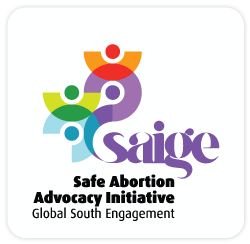UPDATE: The Arizona State has voted to repeal the 1864 near-total ban on abortion on the 1st of May 2024 in a 16-14 vote with two republican senators crossing party lines to vote in favour of repealing the ban [BBC, Aljazeera]. Unless the legislature intervened, the revival of the 1864 law by the Supreme Court ruling on April 9th would have taken effect within 60 days. The prevailing abortion law in Arizona still imposes a legal deadline of 15 weeks on performing an abortion which calls for further liberalisation of the law and removing all barriers to access safe abortion.
We at SAIGE and ARROW urge States to view abortion from a rights-based and reproductive justice approach, and ensure universal access to safe abortion as a human right.
The Asian-Pacific Resource and Research Centre for Women (ARROW) and Safe Abortion Advocacy Initiative – A Global South Engagement (SAIGE) strongly support and stand in solidarity with the French constitutional amendment guaranteeing the right to abortion as France becomes the first country to guarantee abortion rights in the national constitution.
The measure guaranteeing abortion rights in the French Constitution was approved with a majority of 780-72 votes in favour in the French Parliament on the 4th of March 2024. The amendment under Article 34 of France’s 1958 constitution specifies that “the law determines the conditions by which is exercised the freedom of women to have recourse to an abortion, which is guaranteed.” The amendment was sealed in a special public ceremony held on the International Women’s Day 2024.
The French political campaign to legalize abortion began in 1971 with the “Manifesto of the 343” where 343 women signed and declared that they had an illegal abortion and called for legalization of abortion and free access to contraception. This led to repealing the penalty for voluntary termination of pregnancy by legislation passed in 1974 and 1975, and women were allowed to terminate a pregnancy during the first ten weeks (extended to fourteen weeks by legislation in 2022). France is also one of the first countries to legalize the use of mifepristone as an abortion drug in 1988. The cost of abortion, surgical or drug-induced, is covered by national health insurance.
The recent effort to enshrine abortion rights in the French constitution was a direct response to the rollback of reproductive rights in many countries, particularly the US Supreme Court decision to overturn Roe v. Wade rescinding the long-held abortion rights in the US since 1973.
While the newly approved amendment to the French Constitution makes the right to abortion a matter of constitutional relevance, the amendment itself will not loosen any laws. However, the relative difficulty to reverse the right that is now enshrined in the French Constitution compared to other legislative amendments attracts a level of certainty to the recognition of abortion as a fundamental right and further reinforces abortion rights as a matter of political will.
Campaigners still call for more liberalization in the abortion law, particularly to extend the legal deadline beyond 14 weeks. Among other challenges, the struggle for better access to safe abortions in rural areas, limitations posed by conscientious objection exercised by service providers, lack of private abortion services continue. However, it is strongly believed that at a political level, France’s move will increase discussions in the European Parliament on safe abortion rights that can eventually translate to legal reform and change in ground conditions (Note: European Parliament published a resolution dated 15th February 2023) that recognises reproductive coercion and denial of safe and legal abortion care as a form of gender based violence)
We at ARROW and SAIGE celebrate the French Constitutional Amendment as an unequivocal statement that the right to an abortion is a fundamental freedom in a free and equal society and encourage State leaders of the Global South to appreciate the importance of putting reproductive rights in their political agendas to address the lack of access to safe and legal abortions as a matter of utmost importance.
On the other hand, we are anguished to see the recent decision of the Arizona Supreme Court which re-enforced the near-total abortion ban from 1864 that was long blocked by the outcome of Roe v Wade in 1973. The law orders prosecution for “a person who provides, supplies or administers to a pregnant woman, or procures such woman to take any medicine, drugs or substance, or uses or employs any instrument or other means whatever, with intent thereby to procure the miscarriage of such woman, unless it is necessary to save her life.” Unless the legislature intervenes, the law could take effect within 60 days.
The importance of viewing abortion from a human rights and reproductive justice perspective cannot be stressed enough. Removing all barriers interfering with access by women to comprehensive sexual and reproductive health services as well as guaranteeing safe abortion services and quality post abortion care is key to the full realisation of women’s rights and gender equality See ‘ICPD 25+” Access to Safe Abortion in Asia and the Pacific Region’ (ARROW) We call out the Arizona Supreme Court decision as a retrogression that completely disregards the rights based and feminist justification to safe abortion.
Unsafe abortion is one of the leading causes of maternal mortality. Each year, 4.7–13.2% of maternal deaths can be attributed to unsafe abortion (WHO). We see the Arizona decision as increasing the prevalence of clandestine and unsafe abortions, increasing maternal mortality ratios and putting other intersecting groups at risk. We urge the legislature of Arizona to urgently repeal the law by upholding every pregnant person’s right to reproductive decisional autonomy and reproductive health including the right to abortion.
